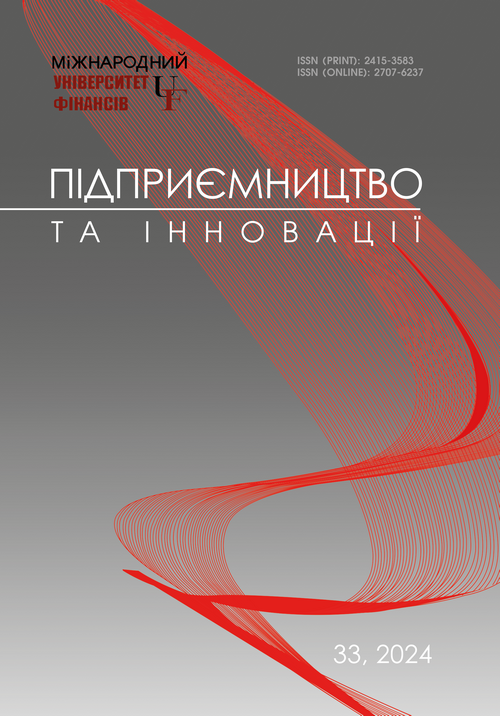СУЧАСНІ ВИКЛИКИ РОЗВИТКУ ЦИФРОВОЇ КУЛЬТУРИ: ЄВРОПЕЙСЬКА ПРАКТИКА
Анотація
У статті розглянуто сучасні тенденції розвитку корпоративної культури транспортно-логістичних підприємств країн ЄС. Для досягнення поставленої мети були використані різні методи дослідження, такі як порівняльний аналіз, системного підходу, структурного аналізу, факторного аналізу, методу синтезу, формалізації, структурно-логічного узагальнення. Метою наукової роботи є дослідити та проаналізувати сучасні виклики розвитку цифрової культури на основі європейського досвіду. Досліджено, що цифрові технології широко використовуються на підприємствах у країнах ЄС. Виявлено, що недостатній рівень цифрових навичок персоналу може стати серйозною перешкодою для успішної діджиталізації та ефективного розвитку підприємства. Встановлено, що сьогодні на ринку праці ЄС залишається загальний дефіцит спеціалістів з високими цифровими навичками.
Посилання
The Future of Jobs Report 2023. World Economic Forum. 2023. URL: https://www.weforum.org/publications/the-future-of-jobs-report-2023/digest/#:~:text=Employers%20estimate%20that%2044%25%20of,problem%2Dsolving%20in%20the%20workplace
Clouet M.E., Alfaro-Tanco J.A., Recalde-Viana M.La cultura como motor de la innovación social corporativa: descifrando sus factores clave. Revista Empresa y Humanismo. 2021. No 24 (2). P. 9–35. DOI: https://doi.org/10.15581/015.XXIV.2.9-35
Grinko A., Bochulia T., Hrynko P. Digital-strategy of the development in accordance with the concept of corporate social responsibility. Innovation and Information Technologies in the Social and Economic Development of Society: Kollektive Monographie. Katowice School of Technology, 2018. Р. 20–31.
Kharchyshyna O., & Trushkina N. Diagnosis of organizational culture and trends in its development in higher education. In: M. Duczmal, & T. Nestorenko (Eds.). Modern management: theories, concepts, implementation: monograph. Opole: The Academy of Management and Administration in Opole, 2021. P. 294–308.
Ринкевич Н.С. Організаційна культура підприємств: виклики, загрози та тенденції. Економічний вісник Донбасу. 2019. № 3(57). С. 123–136.
Харчишина О.В. Стратегічне управління діяльністю підприємства в умовах глобалізації. Вісник Хмельницького національного університету. Економічні науки. 2018. № 5(1). С. 91–94.
Фокіна-Мезенцева К.В. Мотиваційні основи корпоративної культури в системі менеджменту якості підприємства: теорія, методологія, практика: монографія. Херсон : Видавничий дім «Гельветика», 2018. 300 с.
Ringel M., Zablit H., Manly J., Grassl F. How Digital Transforms Innovation Strategy. URL: https://www.bcg.com/publications/2018/most innovative-companies-2018-how-digital-transforms- strategy.aspx
Deloitte 2023 Global Human Capital Trends Report. Deloitte. 2023. URL: https://www2.deloitte.com/ua/en/pages/press-room/press-release/2023/human-capital-trends.html
Is your workforce reinvention ready? PwC. 2023. URL: https://www.pwc.com/gx/en/issues/workforce/hopes-and-fears.html
Leal-Rodríguez A.L., Sanchís-Pedregosa C., Moreno-Moreno A.M., Leal-Millán A.G. Digitalization beyond technology: Proposing an explanatory and predictive model for digital culture in organizations. Journal Innovation Knowledge. 2023. Vol. 3. URL: https://www-elsevier-es.translate.goog/en-revista-journal-innovation-knowledge-376-articulo-digitalization-beyond-technology-proposing-an-S2444569X23001051?_x_tr_sl=en&_x_tr_tl=ru&_x_tr_hl=ru&_x_tr_pto=sc
PwC’s 2023 Employ Financial Wellness Survey. PwC. 2023. URL: https://www.pwc.com/us/en/services/consulting/business-transformation/library/employee-financial-wellness-survey.html
Chernukh D. Corporate culture of the enterprise: essence, models, types. Economic Herald of Donbas. 2022. No. 4 (70). P. 93–104.
Bezpartochna O., Trushkina N., Chernukh D. Influence of digital technologies on the development of the corporate culture of logistics companies. Strategic imperatives of economic systems management in the context of global transformations: scientific monograph / Edited by M. Bezpartochnyi, V. Riashchenko, N. Linde. Riga: Institute of Economics of the Latvian Academy of Sciences, 2021. P. 121–137.
Трушкіна Н.В., Чернух Д.В. Цифрова культура компаній: уточнення термінології. International Science Journal of Management, Economics & Finance. 2023. No. 2(1). P. 19–33. DOI: https://doi.org/10.46299/j.isjmef.20230201.03
World Economic Forum (2023) The Future of Jobs Report 2023. Available at: https://www.weforum.org/publications/the-future-of-jobs-report-2023/digest/#:~:text=Employers%20estimate%20that%2044%25%20of,problem%2Dsolving%20in%20the%20workplace
Clouet M.E., Alfaro-Tanco J.A., Recalde-Viana M. (2021) La cultura como motor de la innovación social corporativa: descifrando sus factores clave. Revista Empresa y Humanismo, no 24 (2), pp. 9–35. DOI: https://doi.org/10.15581/015.XXIV.2.9-35
Grinko A., Bochulia T., Hrynko P. (2018) Digital-strategy of the development in accordance with the concept of corporate social responsibility. Innovation and Information Technologies in the Social and Economic Development of Society: Kollektive Monographie. Katowice School of Technology, pp. 20–31.
Kharchyshyna O., & Trushkina N. (2021) Diagnosis of organizational culture and trends in its development in higher education. In: M. Duczmal, & T. Nestorenko (Eds.). Modern management: theories, concepts, implementation: monograph. Opole: The Academy of Management and Administration in Opole, pp. 294–308.
Rynkevych N. (2019) Orhanizatsiina kultura pidpryiemstv: vyklyky, zahrozy, ta tendentsii [Organizational culture of enterprises: challenges, threats and trends]. Ekonomichnyi visnuk Donbasu – Economic Herald of Donbass, no. 3(570), pp. 123–136. (in Ukrainian)
Kharchyshyna O. V. (2018) Stratehichne upravlinnia diialnistiu pidpryiemstva v umovakh hlobalizatsii [Strategic management of enterprise activities in the conditions of globalization]. Visnyk Khmelnytskoho natsionalnoho universytetu – Bulletin of the Khmelnytskyi National University. Economic sciences. no 5 (1), pp. 91–94. DOI: https://doi.org/10.31891/2307-5740-2018-262-5(1)-91-94 (in Ukrainian)
Fokina-Mezentseva K. V. (2018) Motyvatsiini osnovy korporatyvnoi kultury v systemi menedzhmentu yakosti pidpryiemstva: teoriia, metodolohiia, praktyka [Motivational foundations of corporate culture in the enterprise quality management system: theory, methodology, practice. Kherson: «Helvetyka». (in Ukrainian)
Ringel M., Zablit H., Manly J., Grassl F. (2018) How Digital Transforms Innovation Strategy. Available at: https://www.bcg.com/publications/2018/mostinnovative-companies-2018-how-digital-transforms- strategy.aspx
Deloitte (2023) Deloitte 2023 Global Human Capital Trends Report. Available at: https://www2.deloitte.com/ua/en/pages/press-room/press-release/2023/human-capital-trends.html
PwC (2023) Is your workforce reinvention ready? Available at: https://www.pwc.com/gx/en/issues/workforce/hopes-and-fears.html
Leal-Rodríguez A. L., Sanchís-Pedregosa C., Moreno-Moreno A. M., Leal-Millán A. G. (2023) Digitalization beyond technology: Proposing an explanatory and predictive model for digital culture in organizations. Journal Innovation Knowledge, vol. 3. Available at: https://www-elsevier-es.translate.goog/en-revista-journal-innovation-knowledge-376-articulo-digitalization-beyond-technology-proposing-an-S2444569X23001051?_x_tr_sl=en&_x_tr_tl=ru&_x_tr_hl=ru&_x_tr_pto=sc
PwC (2023) PwC’s 2023 Employ Financial Wellness Survey. Available at: https://www.pwc.com/us/en/services/consulting/business-transformation/library/employee-financial-wellness-survey.html
Chernukh D. (2022) Corporate culture of the enterprise: essence, models, types. Economic Herald of Donbas, no. 4 (70), pp. 93–104.
Bezpartochna O., Trushkina N., Chernukh D. (2021) Influence of digital technologies on the development of the corporate culture of logistics companies. Strategic imperatives of economic systems management in the context of global transformations: scientific monograph / Edited by M. Bezpartochnyi, V. Riashchenko, N. Linde. Riga: Institute of Economics of the Latvian Academy of Sciences, pp. 121–137.
Trushkina N., & Chernukh D. (2023) Tsyfrova kultura kompanii: utochnennia terminolohii [Digital culture of companies: clarification of terminology]. International Science Journal of Management, Economics & Finance, no. 2(1), pp. 19–33. DOI: https://doi.org/10.46299/j.isjmef.20230201.03 (in Ukrainian)



